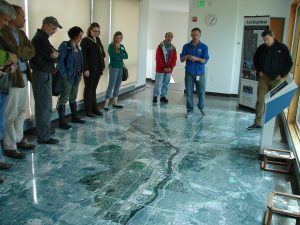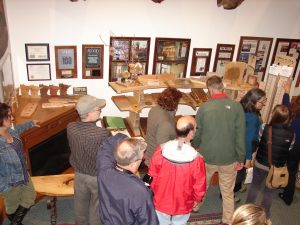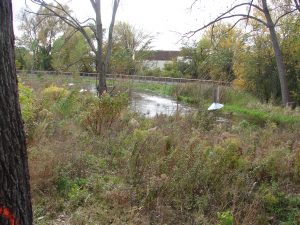
Mississippi Watershed Management Organization headquarters.
The Wisconsin Urban Forestry Council recently met with their Minnesota counterparts, Minnesota Shade Tree Advisory Committee (MnSTAC) to begin exploring ways to share knowledge and resources and to start building a collaborative relationship.
The purpose of this meeting was for these two councils from neighboring states to find areas of similarity and differences to begin building a collaborative relationship. Through sharing successes, challenges, strategies and resources, we believe our work will become more effective and efficient. Urban forestry concerns, issues, opportunities, and goals do not honor state borders, but each state has developed local and unique approaches to developing, managing and enhancing their urban forest resources and we can all learn from each other.
Our Minnesota colleagues provided a superb venue and refreshments, and organized both speakers on relevant topics and a bus tour to projects of special interest to Wisconsin urban forestry professionals. These included presentations on the St. Paul Co-Gen Biofuel facility and an overview of Minnesota’s pollution control design standards. Our tour took us to a local urban wood utilization business, a non-profit organization creating unique building designs to maximize stormwater abatement, and a wetland complex engineered to incorporate stormwater management practices and create a recreational and educational resource.

Wood from the Hood, a local urban wood utilization business.
Wisconsin has been considered a leader nationwide in the urban and community forest community, but we have much to learn from our Minnesota neighbors, especially in the area of stormwater management and sustainable community building. Wisconsin urban forestry professionals have been dealing with EAB longer and have a more formal network of urban wood utilization and can share our successes and challenges in these arenas with our Minnesota colleagues.
Based on this meeting’s success, we are considering ways to expand this idea to include additional councils in the region in the future. Jill Johnson, the U.S. Forest Service’s Urban Forestry Coordinator for the Midwest Center for Urban and Community Forestry, is in a distinctive position to provide key assistance for these potential partnerships. She works with her colleagues around the country to help state forestry agencies, universities, non-profit organizations, and communities meet common urban forestry goals. She oversees various grants that the Forest Service provides for urban forestry programs and projects and is extremely supportive of state urban forestry organizations sharing information and policies. Her interest in serving as convener and facilitator for any joint

St. Louis Park Creek Restoration Project
meetings is an indicator of her opinion that these can serve an important role as we all deal with resource constraints and increased demands affecting our urban forests.
DNR staff and UFC members are now bringing knowledge gained, connections made and resources gathered during this meeting to UFC initiatives and projects and are better equipped to work more effectively on Wisconsin’s urban forestry challenges and objectives.
For more information contact Ellen Clark (EllenA.Clark@Wisconsin.gov), Urban Forestry Communication Specialist, at 608-267-2774.
